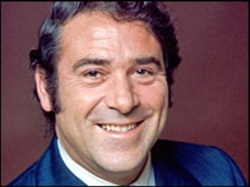Ivor Emmanuel

A fine, strapping fellow, handsome and Welsh, Ivor Emmanuel was born in Taibach. Being Welsh and working-class, there seemed nothing to be done but work in the mines, and when he left school he worked in the mines. He was advised by a fellow Welshman, Richard Burton, to try his luck as a singer, and as a result Emmanuel auditioned for a take-over role in Oklahoma! at the Theatre Royal, Drury Lane, and got the part. His manly look and ringing tones made him a natural for beefy American musicals, of which he became a regular component, but it took a fair time for him to progress beyond small roles that wouldn't get noticed. In 1951 he played Sgt. Kenneth Johnson in South Pacific at the Theatre Royal, Drury Lane, a theatre whose boards he would come to know very well. His third Rodgers and Hammerstein musical in Britain was The King and I in 1953, but by 1956 he was still stuck in minor roles, when he was cast as 'Another Man' and 'State Trooper' in Plain and Fancy, again at the Theatre Royal, Drury Lane. In 1957 he began to get parts that were worthy of him. He played the male lead, baseball player Joe Hardy, in Damn Yankees at the Coliseum, and when the production folded he was the hero, Woody Mahoney, of a revival of Finian's Rainbow staged at Liverpool. Emmanuel had a good cast with him - it included Shani Wallis as Sharon and veteran Bobby Howes as her father - but the show didn't survive its tour. Meanwhile, Emmanuel was making a reputation as a popular singer, especially on television. From 1958 to 1964 he was well-known as the star of a series, Land of Song, in which he was often surrounded by a cutesey childrens' choir. The show helped to emphasise his Welshness. In 1966 he went to New York to star as the Protestant minister David Griffith in a fine musical version of How Green Was My Valley, A Time For Singing, for which he was joined by fellow-stars Tessie O'Shea and Shani Wallis. The Welsh mining village setting made this the most appropriate engagement of his musical theatre career. Despite the exceptionally fine cast (it also included Laurence Naismith) and its lovely score, A Time For Singing only managed 41 performances, and Emmanuel's Broadway career was done with. The following year he was third-billed below Inga Swenson and American Stephen Douglass in 110 In The Shade, an American show (with shades of Oklahoma!) that signally failed to catch on at the Palace Theatre. It closed up Emmanuel's West End career, too. A pity, because he seemed a nice enough sort of chap, and he was Welsh.
